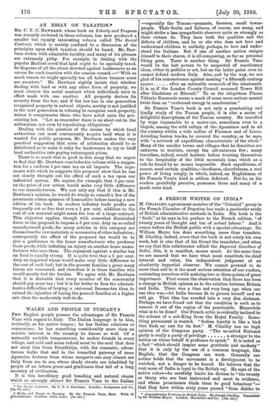WALKS AND PEOPLE IN TIISCANY.t Faw English people possess the
advantages of Sir Francis Vane with regard to Italy. The Italian language is to him, evidently, as his native tongue; he has Italian relations or connexions ; he has something considerably more than an artistic interest in the country he knows so well. Of a naturally sociable temperament, he makes friends in every village, and cold and mean indeed must be the soul that does not envy him these friendships, with the romantic, adven- turous walks that end in the tunnelled gateway of some Apennine fortress from whose ramparts one may almost see Italy from sea to sea, whose shady streets are inhabited by people of an inborn grace and gentleness that tell of a long ancestry of civilisation.
It is this hereditary good breeding and natural charm which so strongly attract Sir Francis Vane to the Italian
• The Social Contract. By C. Y. C. Dawbarn. London : Longman and Co. [Ss. 6d. net.] t Walks and People in Tuscany. By Sir Francis Vane, Bart. With 16 illastratipne. London : John Lane. [Se. net.] —especially the Tuscan—peasants, farmers, small towns- people. Their faults and failures, of course, are many, and might strike a less sympathetic observer quite as strongly as their virtues do. They have both the qualities and the defects of children, and he or she who does not love and understand children is unlikely, perhaps, to love and under- stand the Italians. But if one of another nation resigns himself to their charm, it is all-conquering, so far as personal liking goes. Taste is another thing. Sir Francis. Vane would be the last person to be suspected of reactionary ideas, either in politics or art, but on the latter point even he cannot defend modern Italy. Also, and by the way, we are glad of his remonstrance against naming "a fifteenth century
square after an estimable monarch of the nineteenth. It is as if the London County Council renamed Tower Hill after Gladstone or Disraeli." To us the ubiquitous Piazza Vittorio Emanuele seems a mark of some more serious mental twist than an "exuberant energy in anachronism."
Sir Francis Vane's book is not only a penetrating and kindly study of the Tuscan people, it is also a series of delightful descriptions of the Tuscan country. He travelled by ways impassable to a motor-car, sometimes even to a bicycle, among the wild valleys of the Apennines and in all the country within a wide radius of Florence and of Lucca. Avoiding beaten tracks, he covered the country, as he says, with "a network of expeditions characteristic of the whole." Many of the smaller towns and villages that he describes are unknown to tourists, except the adventurous few; many travellers, indeed, would hesitate before trusting themselves to the hospitality of the little mountain inns, which as a rule he found by no means impossible. Such expeditions, of course, need certain qualities,—hardiness, cheerfulness, a real power of living simply, in which, indeed, an Englishman of Sir Francis Vane's kind is seldom deficient. But he, as his readers gratefully perceive, possesses these and many of a much rarer kind.






































 Previous page
Previous page